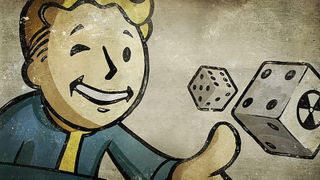Original Fallout co-creator Tim Cain says 'critique of capitalism was never the point' of the games and if anything they're about how 'war is inevitable given basic human nature'
But he doesn't mind if you take an anti-capitalist message away anyhow.

What's Fallout about? War? Nukes? Consumerism? Imperialism? How easy it is to misplace close relatives? All of the above? It's a debate that's raged for decades, and no wonder: Fallout is a pretty rich text as videogame series go, and there's all sorts of messages you can read into the likes of FO1, 2 and New Vegas. 14 years later, you can still click into any forum on the internet and find people arguing about which ending is best for the Mojave in NV (it's Yes Man).
But here's what it's not about, or at least what it's not inherently about: Anti-capitalism. That's according to Tim Cain, one of the series' original co-creators over on his YouTube channel. More specifically, Cain spoke about it in the comments of one of his recent uploads—a video prosaically titled "Capitalism"—in response to a fan asking about Cain's view on Fallout "as a critique on capitalist/corporative greed."
Cain's response was unequivocal: "Critique of capitalism was never the point of Fallout." How can you tell? Because "the game went out of its way to mention that other countries like China were also behaving terribly." Which is very true, of course. In the original isometric Fallouts that Cain worked as a lead on, the US was a horrifying dystopia: A chauvinist, capitalist hellscape that imposed its will on the world and shot anyone who disagreed, but it wasn't unique. Fallout's China—which never dropped the 'smash the old world and forge the new world' ideology of the Mao Zedong Thought era—was also plenty violent. In fact, in Cain's original vision it was China who dropped the bomb first.
"If anything," says Cain, "Fallout is a comment that war is inevitable given basic human nature," and the mode of production doesn't necessarily have all that much to do with it. That doesn't mean Cain disapproves of an anti-capitalist read, mind you: "I don’t think I have any themes that run in common in all my games (maybe mistrust of power)," said Cain, but "people will interpret my games in all kinds of ways. And that’s ok. Everyone brings their own perspective, and a story can mean different things to different people."
Honestly? Pinko that I am, I've always taken an anti-capitalist read on the original Fallout games, but I'm not too surprised that Cain wasn't necessarily trying to make an isometric RPG version of the Grundrisse back in the '90s. When I consider his work like The Outer Worlds—which was intensely satirical of corporate life without really making much criticism of capitalism or private property as a whole—it makes sense that critique of capital just isn't something that interests him that much.
Fair enough, I suppose. Cain's still been responsible for some of my favourite games even if he doesn't share my read of them. Plus, if there's one thing the Marx-adjacent among us don't need help with, it's reading anti-capitalism into literally everything.
The biggest gaming news, reviews and hardware deals
Keep up to date with the most important stories and the best deals, as picked by the PC Gamer team.

One of Josh's first memories is of playing Quake 2 on the family computer when he was much too young to be doing that, and he's been irreparably game-brained ever since. His writing has been featured in Vice, Fanbyte, and the Financial Times. He'll play pretty much anything, and has written far too much on everything from visual novels to Assassin's Creed. His most profound loves are for CRPGs, immersive sims, and any game whose ambition outstrips its budget. He thinks you're all far too mean about Deus Ex: Invisible War.
Most Popular





